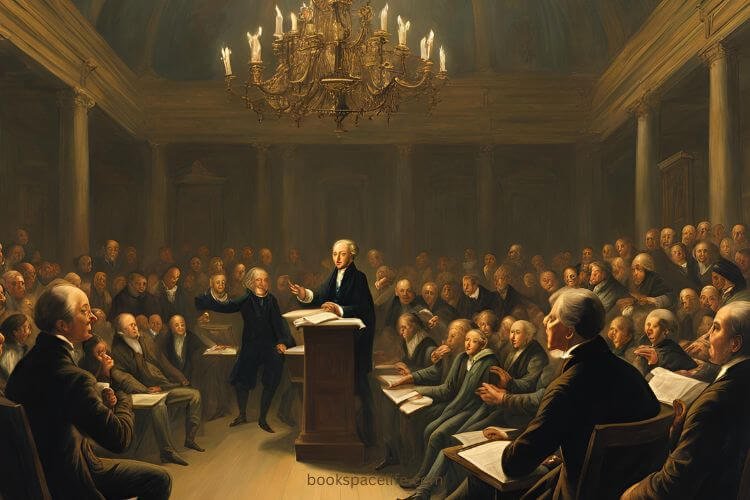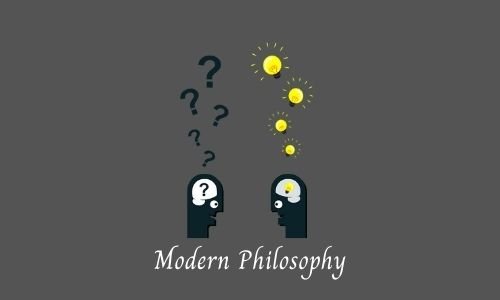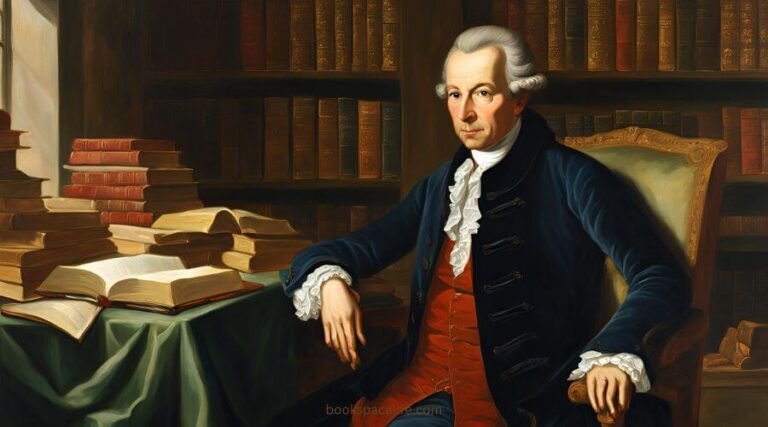Modern Philosophy
Table of Contents
Shaping Thought in the Age of Reason
Modern philosophy, spanning from the late 16th century to the present, marks a pivotal shift in human thought.
This period, often characterized by the rise of reason, individualism, and scientific inquiry, has profoundly influenced contemporary understandings of knowledge, ethics, politics, and existence.
Modern philosophy emerges against the backdrop of the Enlightenment, a time when thinkers sought to challenge traditional authority, embrace empirical evidence, and prioritize human reason.
This blog post explores the key figures, themes, and enduring impact of modern philosophy, highlighting its crucial role in shaping the intellectual landscape of the modern world.

(1) Historical Context of Modern Philosophy
Modern philosophy arose during a time of significant transformation in Europe, influenced by several historical developments:
- The Renaissance: The revival of classical learning during the Renaissance laid the groundwork for modern philosophical inquiry. Humanists emphasized individual potential and the importance of empirical observation, challenging medieval scholasticism.
- The Scientific Revolution: The 16th and 17th centuries saw dramatic advancements in science, with figures like Copernicus, Galileo, and Newton transforming the understanding of the natural world. The emphasis on observation and experimentation contributed to a shift in philosophical thought.
- The Enlightenment: The 18th century, often termed the Age of Enlightenment, saw philosophers advocating reason, skepticism of tradition, and the belief in human progress. Enlightenment thinkers sought to apply rational thought to all areas of human endeavor, from politics to ethics.
- Political and Social Change: The Enlightenment also coincided with significant political upheavals, including the American and French Revolutions. Philosophers began to explore concepts of democracy, individual rights, and social contracts.
(2) Key Figures in Modern Philosophy
1) René Descartes (1596-1650)
Often referred to as the father of modern philosophy, Descartes introduced a new approach to philosophical inquiry based on skepticism and systematic doubt.
His famous dictum, “Cogito, ergo sum” (“I think, therefore I am”), emphasizes the certainty of self-awareness as the foundation of knowledge.
- Key Ideas: Descartes is known for his method of doubt, which involves questioning all beliefs to establish a firm foundation for knowledge. He also contributed significantly to metaphysics and epistemology, proposing a dualistic view of reality that separates mind and body.
2) Baruch Spinoza (1632-1677)
Spinoza’s philosophy represents a radical departure from traditional views of God and nature. He argued for a pantheistic understanding of the universe, identifying God with nature itself.
- Key Ideas: Spinoza’s work, particularly in “Ethics,” explores the nature of substance, the interrelation of all things, and the importance of rational understanding. He emphasized the role of emotions in human life and the pursuit of intellectual love of God as the path to true happiness.
3) Gottfried Wilhelm Leibniz (1646-1716)
Leibniz is known for his contributions to metaphysics, logic, and mathematics. He proposed the concept of monads—simple substances that make up reality—and sought to reconcile faith and reason.
- Key Ideas: Leibniz introduced the principle of sufficient reason, asserting that everything must have an explanation. His optimism about the nature of the world, famously summarized in his assertion that we live in “the best of all possible worlds,” has been both influential and controversial.
4) John Locke (1632-1704)
Locke is often regarded as the father of empiricism and political liberalism. His ideas on the nature of knowledge and human rights laid the groundwork for modern democratic thought.
- Key Ideas: In “An Essay Concerning Human Understanding,” Locke argued that knowledge is derived from sensory experience. He also emphasized the concept of the social contract, advocating for government as a protector of individual rights and liberties.
5) David Hume (1711-1776)
Hume is a central figure in empiricism and skepticism. His philosophical inquiry focused on human understanding, causation, and morality.
- Key Ideas: In “An Enquiry Concerning Human Understanding,” Hume questioned the validity of causation and challenged the notion of innate ideas. He also explored the role of sentiment in morality, arguing that ethics is rooted in human feelings rather than reason alone.
6) Immanuel Kant (1724-1804)
Kant represents a turning point in modern philosophy, synthesizing rationalism and empiricism. His work laid the groundwork for much of contemporary philosophy, especially in epistemology and ethics.
- Key Ideas: In “Critique of Pure Reason,” Kant introduced the distinction between a priori (independent of experience) and a posteriori (dependent on experience) knowledge. He argued that human understanding shapes experiences, leading to his famous claim that we can never know things as they are in themselves (noumena), only as they appear to us (phenomena). In ethics, Kant’s categorical imperative emphasized the importance of universal moral principles derived from reason.
7) Georg Wilhelm Friedrich Hegel (1770-1831)
Hegel’s philosophy represents a culmination of modern thought, emphasizing the development of ideas through dialectical processes. He explored the nature of reality as a dynamic, evolving system.
- Key Ideas: Hegel’s dialectical method involves the interplay of thesis, antithesis, and synthesis, suggesting that contradictions drive historical progress. His works, including “Phenomenology of Spirit,” explore consciousness, self-awareness, and the development of freedom.
8) Friedrich Nietzsche (1844-1900)
Nietzsche’s provocative philosophy challenges conventional morality and metaphysics. His concept of the “will to power” and the idea of the “Übermensch” (overman) have had a lasting impact on existentialism and postmodernism.
- Key Ideas: Nietzsche critiqued traditional moral values, declaring the “death of God” and advocating for a re-evaluation of values. His emphasis on individuality and self-creation has influenced various fields, including literature, psychology, and philosophy.
(3) Major Themes in Modern Philosophy
1) Epistemology: The Nature of Knowledge
A central concern in modern philosophy is the question of how we know what we know. The divide between rationalism and empiricism highlights different approaches to understanding knowledge:
- Rationalism: Thinkers like Descartes and Leibniz argued that reason is the primary source of knowledge, emphasizing innate ideas and deductive reasoning.
- Empiricism: In contrast, philosophers like Locke and Hume contended that knowledge arises from sensory experience, prioritizing observation and induction.
2) Metaphysics: Understanding Reality
Modern philosophers grappled with the nature of reality, exploring concepts such as substance, causation, and the relationship between mind and body:
- Dualism: Descartes’ dualism separates mind and body, raising questions about their interaction and the nature of consciousness.
- Monism: Spinoza’s pantheism and Hegel’s idealism propose unified frameworks, suggesting that all reality is interconnected.
3) Ethics: Morality and Human Behavior
The exploration of ethics in modern philosophy reveals differing approaches to morality:
- Deontological Ethics: Kant’s categorical imperative emphasizes duty and universal moral principles.
- Consequentialism: Hume’s focus on sentiment and consequences leads to a more flexible understanding of morality, prioritizing the well-being of individuals.
4) Political Philosophy: Authority and Freedom
Modern political philosophy emerged in response to changing social and political landscapes, emphasizing individual rights, social contracts, and the role of government:
- Social Contract Theory: Thinkers like Locke and Rousseau posited that governments derive their authority from the consent of the governed, advocating for individual liberties and democratic governance.
- Critiques of Authority: Nietzsche and Marx challenged traditional structures of power, advocating for a re-evaluation of values and social systems.
5) Existentialism: Individual Meaning and Authenticity
In the late 19th and 20th centuries, existentialist thinkers explored themes of individual existence, freedom, and authenticity:
- Existential Freedom: Nietzsche’s emphasis on self-creation and choice, alongside existentialists like Sartre and Kierkegaard, underscores the importance of personal responsibility in constructing meaning.
(4) The Influence of Modern Philosophy
The impact of modern philosophy is profound, shaping various fields and societal developments:
- Science and Epistemology: The emphasis on empirical observation and rational inquiry laid the groundwork for the scientific method, influencing advancements in science and technology.
- Political Theory and Human Rights: Modern philosophers contributed to the development of democratic thought, individual rights, and social justice movements, influencing contemporary political systems.
- Ethical Frameworks: The exploration of morality during the modern period shaped contemporary ethical theories, including utilitarianism, virtue ethics, and deontological ethics.
- Psychology and Human Behavior: Philosophers like Nietzsche and Kierkegaard influenced the development of psychology, emphasizing the importance of individual experience and emotion in understanding human behavior.
- Postmodernism and Critiques of Modernity: The ideas of modern philosophers laid the foundation for postmodern critiques of reason, truth, and authority, influencing contemporary philosophy, literature, and art.
(5) Conclusion
Modern philosophy represents a transformative era that reshaped human thought, emphasizing reason, individualism, and empirical inquiry.
The contributions of key figures like Descartes, Locke, Hume, Kant, and Nietzsche have left an indelible mark on various fields, from science and politics to ethics and psychology.
As we engage with the ideas and questions raised by modern philosophers, we are reminded of the enduring relevance of their insights in our contemporary world.
The quest for knowledge, the exploration of morality, and the pursuit of individual freedom continue to shape our understanding of existence and guide our collective journey into the future.
In a rapidly changing world, the principles of modern philosophy remain vital in navigating the complexities of human experience, reminding us of the power of reason and the importance of individual thought in the pursuit of truth.








